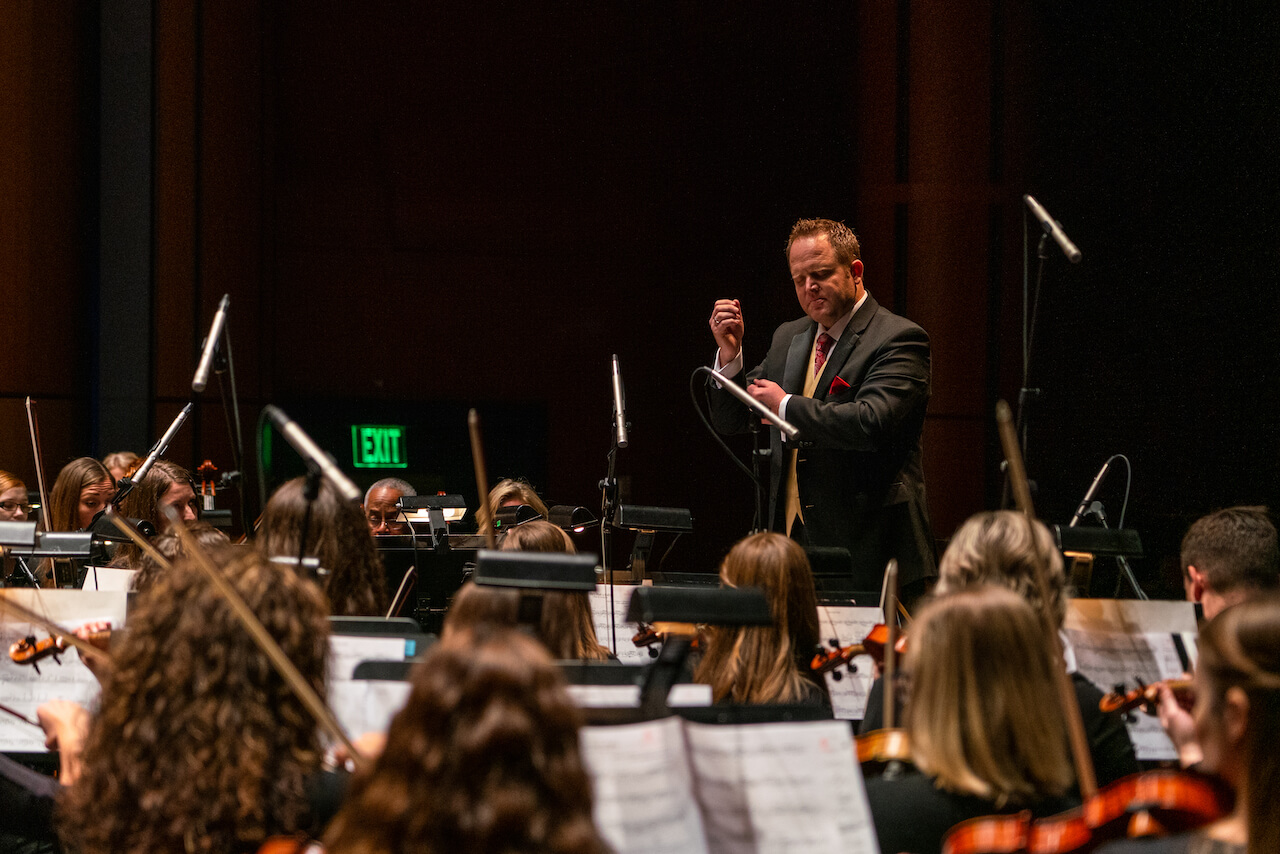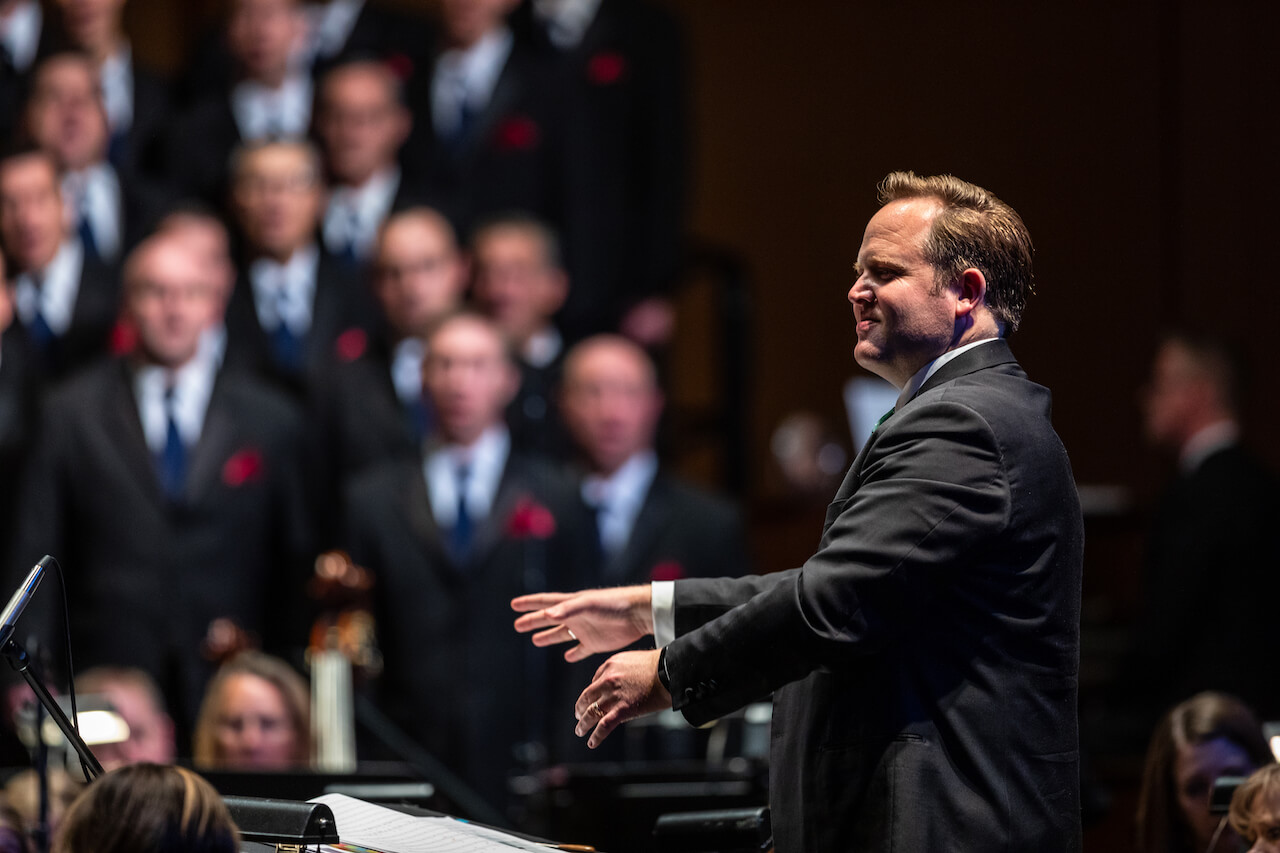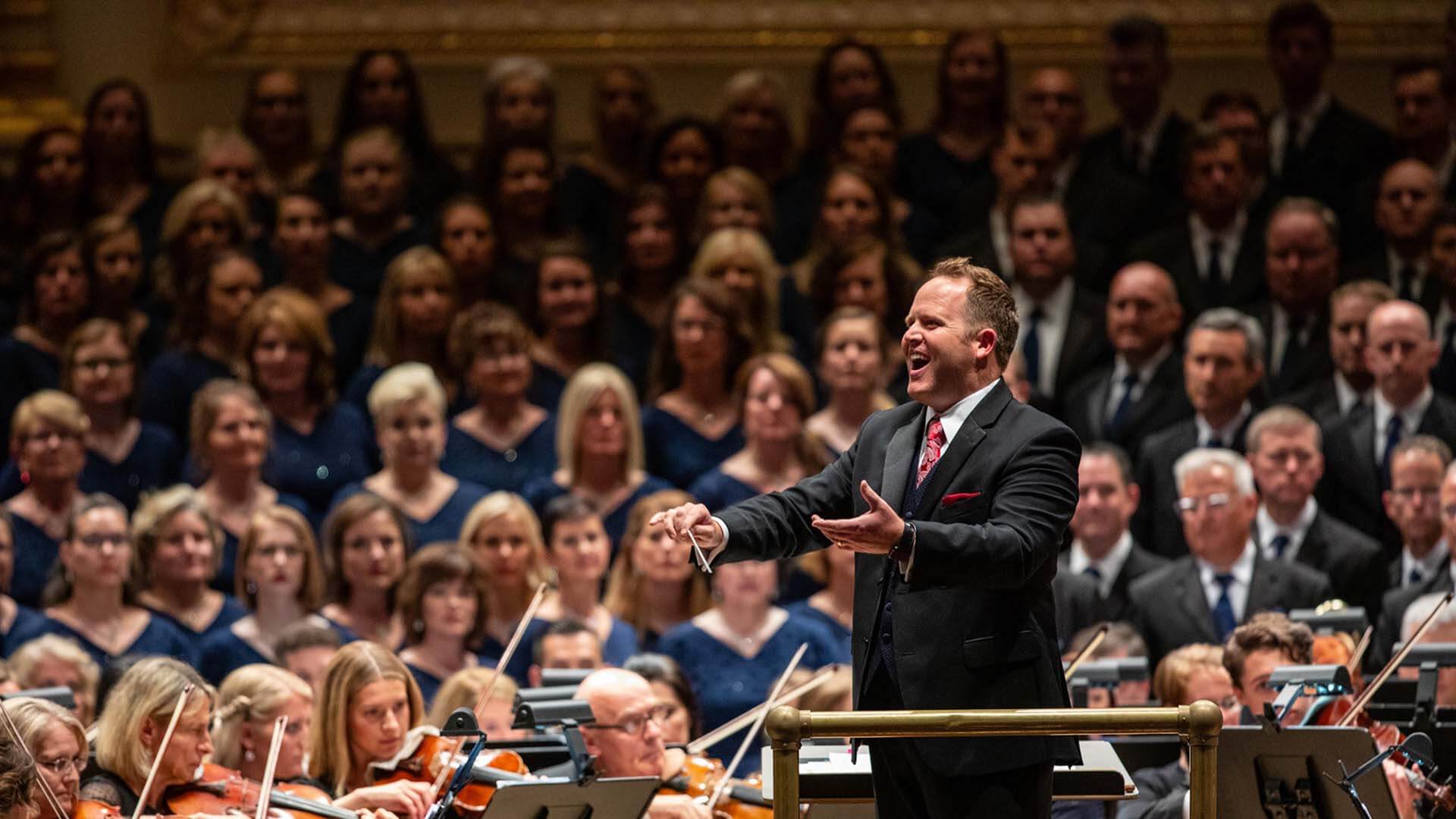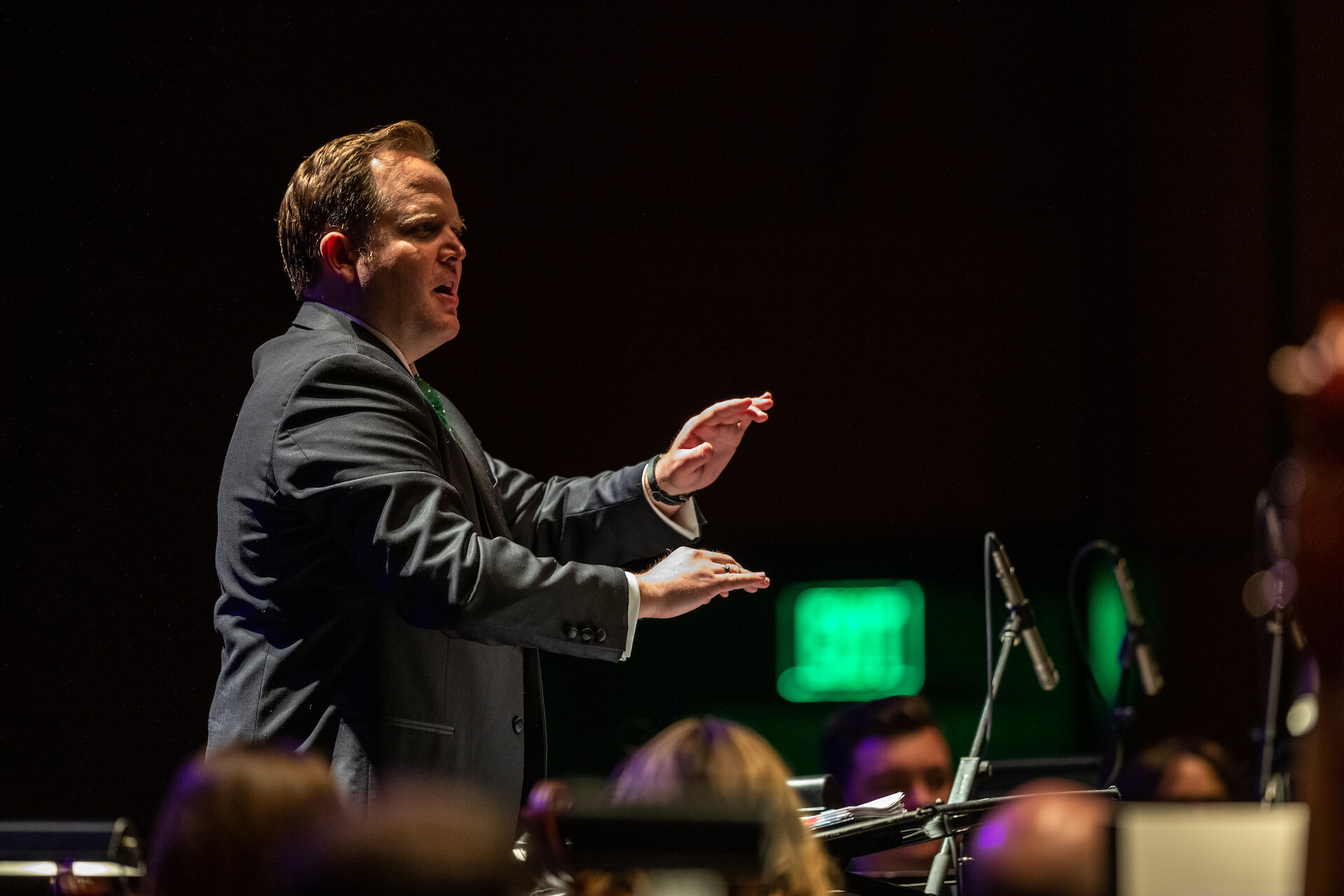This is the first in a series of articles about the musical directors of Millennial® Choirs & Orchestras, featured in this blog post.
We recently asked Dr. Cory Mendenhall, Dean & Musical Director of Millennial Choirs & Orchestras, about why he loves what he does (“I love looking out into the faces of musicians who are musically, artistically and spiritually in tune — and are conscious of it!”), what inspired him to become a conductor (“[My grandpa taught] me the importance of using the talents and gifts my Father in Heaven had blessed me with to freely uplift and serve others”), and what advice he would give to aspiring conductors (“YOU should take care of people. The people will take care of the music“).

About Cory Mendenhall
(Biography courtesy of Millennial Choirs & Orchestras)
Dr. Cory Mendenhall and his wife, Aprel, are the parents of four beautiful children. Mendenhall serves as Dean & Musical Director of Millennial Choirs and Orchestras (MCO®) and principally administers MCO’s Utah and California locales. Alongside his colleagues, Mendenhall has served as conductor for three of MCO’s albums: To Be American (which debuted at #1 on the Billboard’s Traditional Classical Chart), Amazing Grace: Songs of Atonement, and Millennial Song (which debuted at #1 on the Billboard’s Classical & Classical Crossover Charts).
Prior to his work with MCO, Mendenhall served as Director of Choral Activities at Maple Mountain High School (Spanish Fork, UT) and Provo High School (Provo, UT). His unique and informed work with adolescent voices in the choral setting brought celebrated regional and nationally renowned attention to his high school choirs, known for their beautiful tone, stellar musicianship, and choral artistry. Selected by rigorous audition, Mendenhall collaborated with his colleagues in preparing and conducting the MMHS Choirs and Orchestra for a solo performance of Vivaldi’s Gloria RV 589 in Carnegie Hall in February 2016. While at Provo High, the PHS Chamber Singers were also featured in the National High School Choral Festival at Carnegie Hall in 2009.
Mendenhall earned a doctor of musical arts degree in choral conducting, with cognate studies in orchestral conducting from the University of Utah. He earned a master’s degree in choral conducting from Brigham Young University and a bachelor of music degree in choral music education from Utah State University, with related studies in organ performance. During his graduate work, Mendenhall conducted the University of Utah Chamber and A Cappella Choirs; while at BYU he served as the assistant conductor of the BYU Men’s Chorus and conducted the BYU University Chorale. His mentors include Barlow Bradford, Robert Baldwin, Ronald Staheli, Rosalind Hall, Jean Applonie, Will Kesling, Lane Cheney, Douglas Bush, and James Drake.
Aside from his work with MCO, MMHS, and PHS, Dr. Mendenhall served as Artistic Director and Conductor of the Mapleton Chorale (2003-2013). Cory enjoys serving as an organist at the Provo (Utah) Missionary Training Center for The Church of Jesus Christ of Latter-day Saints and spending time with his wife and children, parents John & Lenna Mendenhall, and extended family & friends in Utah’s stunning mountains.
Lemonade Stand: What is your musical background?
Cory Mendenhall: I began playing the piano (by ear) at the age of four. My family came home from church one Sunday and while everyone was preparing our family dinner, I went to the piano in our living room and played the sacrament hymn that was sung in sacrament meeting that day: “There Is a Green Hill Far Away.” My parents noticed my music from the kitchen and came into the living room, surprised to see and hear me playing the hymn the way I thought I had heard it a few hours earlier. Of course, I was playing the hymn in a key (likely C Major) other than the key that it appears in the hymnbook, and some of my chords differed from the original hymn as composed by John H. Gower (1855 – 1922).
I continued playing the piano by ear, interpreting whatever I heard in church, at school, on the radio, or in live choral or instrumental performances, absent of any formal sheet music on the music stand. I enjoyed creating original songs as well and won my elementary school’s “Reflections” contest in music for creating an original composition. My mom helped me record the composition at the piano, and we submitted it to the Reflections committee. However, shortly after being named as the winner of the competition, I was disqualified because I did not actually notate the music, which only existed in my mind and heart.
I then set out to learn to read music by joining my middle school band, learning to play the trombone! I learned the notes of the bass clef very quickly by matching the notes I was learning on the trombone with bass clef notes on the piano. I would sit at my family’s piano bench with my trombone, matching the notes learned in school with those I had been playing only by ear for years prior to choosing to learn an instrument.
At the age of 12, I was called as a ward [congregation] organist for my church congregation by a bishop who knew I played the piano but did not know I didn’t read music. When my parents tried explaining to him that I didn’t read music, he listened intently but did not retract the calling to serve as a ward organist, and he encouraged me to practice regularly in order to do my part in building the Lord’s Kingdom. That calling greatly enhanced my ability to read music. Coupled with my ability to play by ear, reading music invoked abilities to regularly re-harmonize hymns (often the last verse to heighten textual awareness for my ward family), and I continue this practice when prompted by the Spirit as an organist at the Provo Missionary Training Center for The Church of Jesus Christ of Latter-day Saints.

LS: Who or what inspired you to pursue choral music as a career?
CM: I had the opportunity to study and perform music all throughout my grade-school experiences. I also sang in an extra-curricular, faith-based choir — the Utah Valley Children’s Choir — which brought on a great love for sacred choral music. I served as the drum major for my high school’s marching band during my junior and senior years, which brought on an appreciation for conducting and the ability to connect with fellow musicians in creating inspiring music. Additionally, my grandfather, Frank Gull, who learned to play charts for home organ in his senior years, engaged in performing miniature concerts and programs for residents at retirement centers, senior assisted-living homes, and nursing and rehab care facilities. He invited me to take part in these performances, often teaching me the importance of using the talents and gifts my Father in Heaven had blessed me with to freely uplift and serve others.
My grandpa and I typically prepared and performed 1 – 2 programs per month specifically for 1 – 2 retirement/advanced age centers. I found immense joy in sharing music my grandpa and I had prepared with those who seemed to appreciate it most! I am forever grateful for my grandpa’s example in serving others with the gifts we’re given. All of these experiences throughout my childhood and youth prepared me to study and teach music professionally.
LS: What kind of education did you pursue to become a choral conductor?
CM: Following my service as a missionary for The Church of Jesus Christ of Latter-Day Saints, I enrolled at Utah State University (USU), majoring in choral music education. I also studied organ performance at USU and gained a deep love for choral and organ literature (which share a common, rich heritage and history). I also earned master’s and doctorate degrees in choral & orchestral conducting from Brigham Young University (BYU) and the University of Utah (U of U), respectively.

LS: Who have been some of your favorite mentors and why?
CM: I’ve been blessed with so many mentors who’ve blessed and shaped my personal and professional life! I’ve already mentioned my grandfather. John Hawkins and Roger Tuckett were my first “formal” music teachers outside of entry-level piano lessons with a neighbor, Anita Stewart (not related to brothers Brett & Brandon Stewart, who are the founders of Millennial® Choirs and Orchestras), who cared as much about my natural ability to play by ear as she did my ability to learn to accurately read and interpret music. Beverly Thomas, founder and director of the Utah Valley Children’s Choir introduced me to sacred choral music and inspired me with her ability to connect music to important chambers of the heart and soul and furthered my appreciation for serving the Lord with the gifts we’ve been blessed with.
Professional mentors include Dr. Will Kesling (USU), who helped me gain a great love for works composed by masters and the power of compelling, passionate conducting. Dr. Ronald Staheli (BYU) infused a sense of clarity and beauty of tone in true choral “oneness” that transformed my spiritual convictions found within music and what it has to offer and what it takes to offer it. Dr. Barlow Bradford (U of U) inspired me to become a true artist through the power of compelling, authentic gesture capable of transforming choral sonorities into convincing, elaborate, first-rate nuances that elevate participants and listeners alike. Each of these mentors (and many more) have immensely shaped my ability to take the podium with spiritual, artistic and musical awareness at mind and in heart, which has been paramount in my desire to meaningfully and memorably collaborate with each musician I’m fortunate to create music with.
LS: What do you love most about what you do?
CM: Some of my most influential musical opportunities and moments are the result of true, united brother-/sisterhood, coupled with convincing contrast provided only by and through the music itself. I love looking out into the faces of musicians who are musically, artistically and spiritually in tune — and are conscious of it! Additionally, the pure, uninhibited conviction that comes from a child as they sing reminds me of what it means to be a true disciple of Christ.
LS: If you could give advice to an aspiring choral conductor, what would that be?
CM: Develop a true sense of the music you wish to conduct, and develop a work ethic to research and study in order to become truly “at one” with the music. Really study the human voice and its anatomy. Seek out mentors who will appropriately challenge you as a musician and person. Never settle for anything other than your absolute best. Remain open to and invite positive feedback on your practice as a musician and conductor, but be mindful of those who may want to cause you to feel “less than” so they might feel “more than.” Love these people by letting any and all good they have to offer influence you to improve your craft, but don’t give credence to others’ tactics or methods which may stem from personal insecurities or discontent.
Always strive to be a first-rate version of YOU in every way. Everyone else is already taken! Be patient with those you conduct, knowing that they are every bit trying to be patient with you and your expectations. Remember the podium is not “command central.” Rather, it is central to the command to “love thy neighbor as thyself.”
As conductor, YOU should take care of people. The people will take care of the music. The music will take care of the profession. The profession takes care of the art. The art takes care of the culture. The culture takes care of civilization. Civilization takes care of the future. At every step, excellence is the only acceptable standard!

LS:When was a time where you were able to turn lemons into lemonade?
CM: I was diagnosed with cancer at an unexpected adult age. As a father, husband, son and brother, I was very scared at the time of diagnosis to learn that my body was carrier to a disease that, if left undetected or unable to be remedied, could significantly alter my mortality and my perceived hopes and dreams. This medical trial challenged me spiritually. But housed within each challenge were opportunities to trust in the Lord and His individual, unique plan for each of His children and gain an immense appreciation for the infinite truth of “second chances.” I gained an acute awareness of the importance of receiving cues from our bodies, divinely created in the image and likeness of God, who so miraculously created physical and spiritual systems of “checks and balances” which can be trusted.
LS: What do you fear most in life?
CM: Letting fear drive me from what matters most.
